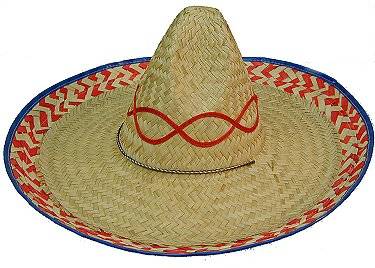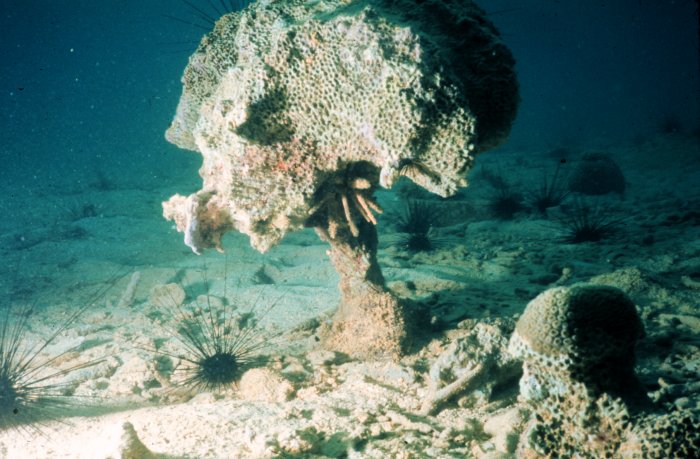
These are our tips. If anyone else has any others, please do comment and I'll edit them in (naturally with a credit to you):
* Wear light-colored, loose-fitting clothes (as few as is appropriate). Light colors reflect the heat, while dark colors absorb it. Also choose materials like cotton, which allow your skin to breathe.
* Remember to lather on the sunscreen, if you are going outside. Rub it on everywhere. You would be amazed at the amount of people who burn the bottom of their feet; because they used the sunscreen all over their bodies except there, then sunbathed on their front. If you are going into the water, then you will have to use biodegradable sunscreen. This will wash off in the water, so remember to reapply it when you come out. Also note that the sun can still burn you in the water, so keep alternating which parts of you are exposed to it above the surface. Thinking here of all the amateur snorkellers, who were so entranced by the pretty fish and coral, that they failed to notice their backside turning bright red. Occasionally rolling or treading water for a few minutes will ease everything. Nipping out to reapply the biodegradable sunscreen, when you feel yourself burning, is even better. Always read the instructions on the sunscreen, particularly if it's an unfamiliar brand, as they do differ.

* If you must rush around, then do so in the early morning or in the evening. It's cooler then, so you have less chance of over-heating.
* Ensure that you are always hydrated. Heat causes sweating; sweating causes loss of water from your body; your body needs water. Therefore keep bottled water on you and take a sip, if you feel your mouth going dry. If you are going on a day-trip somewhere, take lots of bottled water with you, especially if you aren't sure if your destination has shops or a water fountain.
* Carry a spray bottle of water. If you're getting hot, then spray it over yourself. This works particularly well if you then step in front of a fan or into an air-conditioned building, as the water dries off you, cooling you down. This is precisely how sweat works to cool you down too.
* If you have access to a freezer, then freeze bottled water. As you heat up, go and get one out (replacing it with another bottle to freeze). Roll the frozen bottle around the back of your neck and anywhere else that's feeling too hot. This wil cool you down. It will also thaw the water. You can then open the bottle for a nice, refreshing, ice-cold drink.

* Carry a zip-bag with cool, damp fannels in it. If you are getting too hot, take out a fannel and place it at the back of your neck. It will instantly cool you down.
* Relax in the shade. There are usually no shortage of hammocks under palm trees or sun loungers with parasols on the beaches of Mexico. Use them. You really will regret falling asleep, on an exposed beach, in the height of the afternoon sun, if you don't. Mainly because you will spend the rest of your vacation applying aloe vera to deep burns.
* Try not to eat heavy meals during the extreme heat of the day. It will just make you feel more lethargic. Do eat spicy foods. It's no accident that spicy foods tend to originate in countries known for their sunshine, like Mexico. Spicy foods help you to sweat more, which cools you off. Alternatively, light foods, like salad or fruit, are good for keeping you fuelled up with energy.
* Soak your feet in cold water. The temperature of your feet often affects the temperature of your whole body.
* Contemplate the sunhat versus no sunhat debate.
 A hat will shield your face from the sun, thus protecting you from sunburn; but it might also trap heat. We lose most of our body heat from the top of our heads, so that's the last place where you want to retain it. A compromise is a hat that allows ventilation to your head, like a cotton cap or a straw hat with loose weaving. In fact, why not go for the hat that was actually designed for protection from the Mexican heat? A sombrero! High-crowned to provide ventilation; wide-brimmed to cast a shadow over your face and shoulders. Precisely what is needed here!
A hat will shield your face from the sun, thus protecting you from sunburn; but it might also trap heat. We lose most of our body heat from the top of our heads, so that's the last place where you want to retain it. A compromise is a hat that allows ventilation to your head, like a cotton cap or a straw hat with loose weaving. In fact, why not go for the hat that was actually designed for protection from the Mexican heat? A sombrero! High-crowned to provide ventilation; wide-brimmed to cast a shadow over your face and shoulders. Precisely what is needed here!* Don't tough it out. Never, ever think to yourself, 'yeah, I know I'm burning, but I'm so comfortable that I'll just lie here a couple of moments more'; or 'yeah, I know I'm thirsty, but I'll just hang on until we've walked this mile to that nice, shaded restaurant'. Listen to your body's needs and react immediately, that way you're not storing up trouble for later.
* If the beach is too hot, then go sight-seeing. Places like Cancún are full of attractions, shopping malls, hotel amenities, cafes etc, which all have air-conditioning and/or shade from the sun. You can always return to the beach when it's cooled down.
So those are our tips. Anyone got any more to add?



